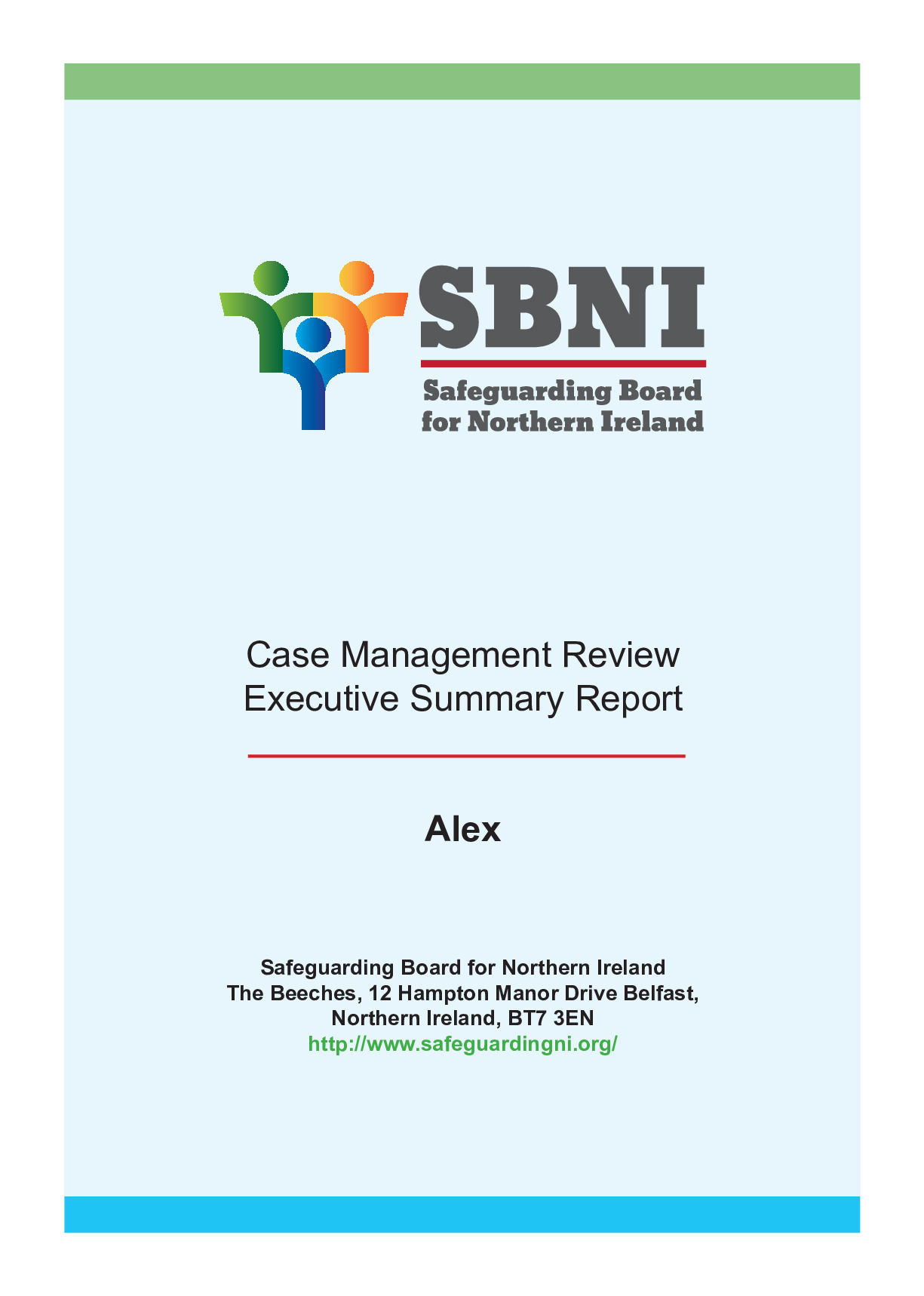Alex

Introduction
The Safeguarding Board for Northern Ireland (SBNI) is an independent statutory body established under the Safeguarding Board Act (Northern Ireland) 2011. The Board became operational in September 2012 and was established by the Department of Health, Social Services and Public Safety (DHSSPS) in recognition of the fact that children are more likely to be protected when agencies work in an all-inclusive, coordinated and consistent way.
The SBNI is made up of key partner organisations from the statutory, community and voluntary sectors, along with lay members who are public appointments. The Board is the key process for agreeing how agencies working with children and families in Northern Ireland will cooperate to safeguard and promote the welfare of children and for ensuring the effectiveness of those agencies. In carrying out our responsibilities, the SBNI will ensure that organisational boundaries between professionals, agencies and sectors do not act as barriers to protecting children and young people up to the age of 18 years.
Section 3(4) of the Safeguarding Board Act (Northern Ireland) 2011 provides for a Case Management Review (CMR) function and the establishment for a CMR Panel to undertake the CMR function on the SBNI’s behalf. Section 3(4) of the Safeguarding Board Act (Northern Ireland) 2011 (“the 2011 Act”) places a duty on the Safeguarding Board to carry out Case Management Reviews (CMRs) in prescribed circumstances. These circumstances are prescribed under regulation 17 of the Safeguarding Board for Northern Ireland (Membership, Procedure, Function and Committee) Regulations (Northern Ireland) 2012 (“the 2012 Regulations”) Section 7(1)(c ) of the 2011 Act places a duty on the Safeguarding Board to establish “a committee to be called “the Case Management Review Panel” (“CMR Panel”). In accordance with regulation 38 of the 2012 Regulations, the functions of the CMR Panel include “holding a case management review in such circumstances as are described in regulation 17(2) and (3); and establishing arrangements for sharing the findings of case management reviews.” CMRs are undertaken not to find fault with individual practice but rather to examine the organisational systems and processes that assist or allow individuals to make decisions or to act in certain ways in meeting the needs of children and their families, and keeping vulnerable children safe. The focus of the CMR is on learning, that is:
- learning from what has worked well and then build upon it; and
- what has not worked well and determine how this should be prevented in the future.
Other processes co-exist to determine how a child may have died or been seriously injured, or whether individuals need to be held to account for their actions in respect of the child. These issues are not the responsibility of the SBNI.
The DHSSPS have set out clear principles underpinning the CMR process:
- there should be a culture of continuous learning and improvement across the organisations which work together to safeguard and promote the welfare of children – identifying opportunities to draw on what works and promote good practice;
- the process should be conducted with appropriate transparency and sufficient openness to engender professional and public confidence in it;
- the scope of reviews must be proportionate according to the scale and level of complexity of the issues being examined;
- CMRs must be led by individuals who are independent of the case under review and of the organisations whose actions are being reviewed;
- professionals must be involved fully in reviews and invited to contribute their perspectives without fear of blame for actions they took using their professional judgment and with good intentions;
- families, including surviving children, should be clear about how they are going to be involved in reviews and their expectations should be managed; and
- improvement must be sustained through regular monitoring and follow up so that the findings from these reviews make a real impact on improving outcomes for children. The SBNI is committed to undertaking CMRs in line with these principles.
Reason for commissioning the Case Management Review
Alex was found lifeless by the infant’s mother in the parents’ bed and woke Alex’s father who attempted resuscitation of the infant while mother immediately phoned for help. When an ambulance arrived shortly after, the crew took over administering CPR and rushed Alex to hospital where further attempts to revive the infant were unsuccessful. Alex was pronounced dead at the hospital. The hospital emergency department immediately informed the Police Service of Northern Ireland (PSNI) and the Social Work Out of Hours Duty Officer who in turn advised the Trust Chief Executive and Department of Health and Social Services and Public Safety (DHSSPS). The Health and Social Care Board (HSCB) and SBNI were also informed.
The preliminary findings of the post mortem indicated Alex’s death was a Sudden Unexplained Death in an Infant (SUDI) and that the death was not suspicious.
After careful consideration, the SBNI determined that this was a case which met the requisite criteria prescribed under regulation 17(2) of the 2012 Regulations for carrying out a CMR. The rationale for referring the matter to the CMR Panel was as follows: –
| Type of Resource |
|
|---|---|
| Publication Date | |
| Committee/Panel |
|
| Audience |
|
- alex_01_2016.pdfDownload